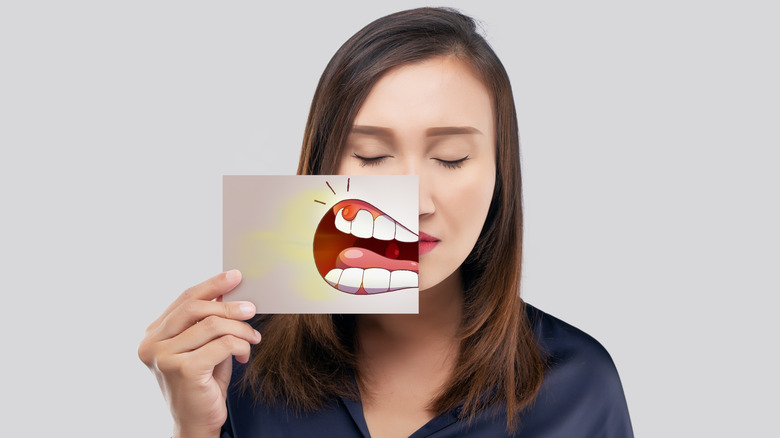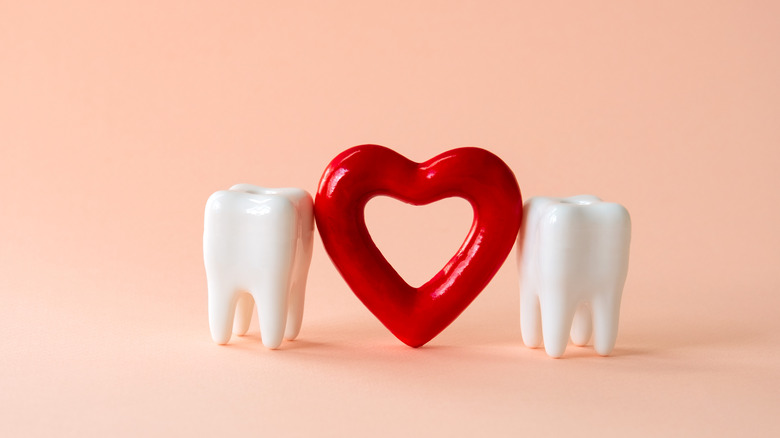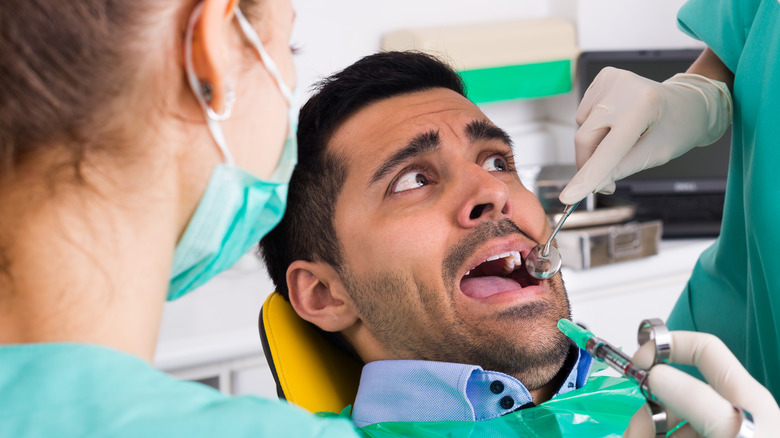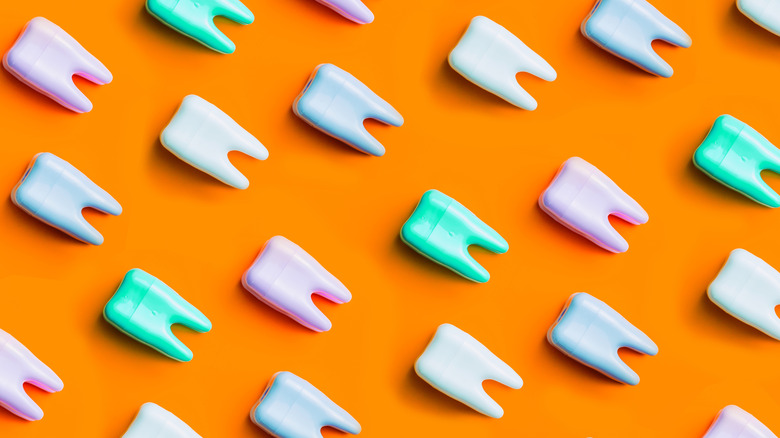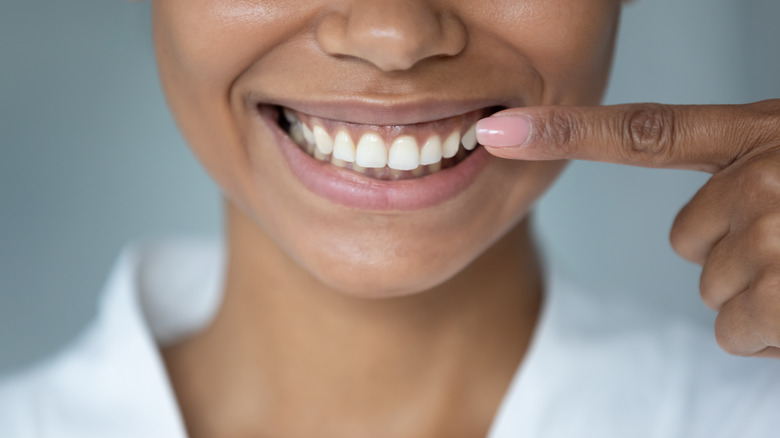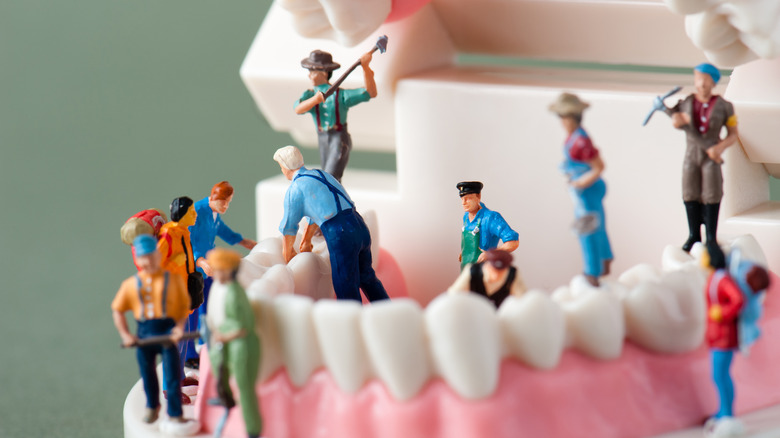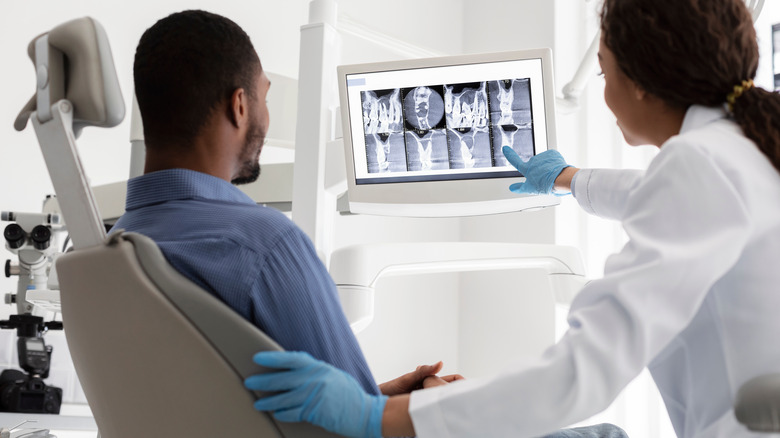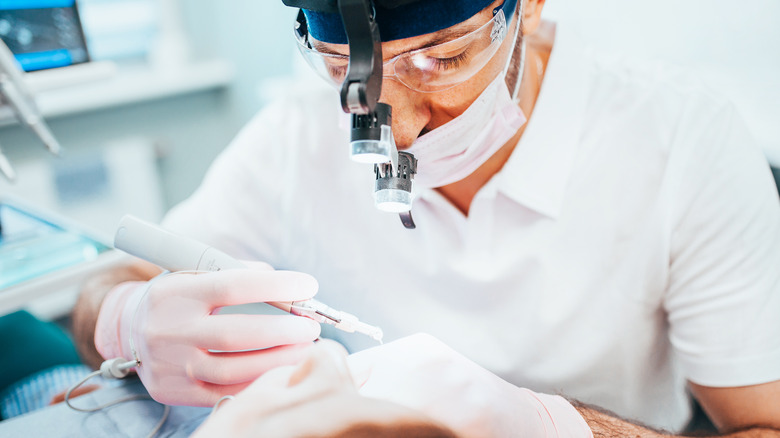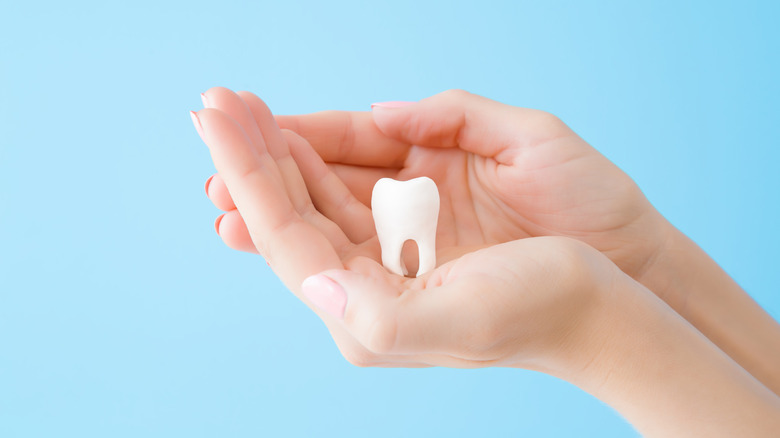Warning Signs From Your Teeth You Shouldn't Ignore
Dentistry has come a long way in the last two centuries. Anesthesia for tooth extractions began in 1844; dental x-rays began in 1896 (via Britannica). Modern dental implants were first introduced in 1913, and high-speed dental drills came into use in 1957. The 20th century saw a shift in the role of the private practice dentist, from a focus on repairing and extracting teeth to the prevention of oral disease.
Thanks to all these advances, the baby boom generation will be the first cohort in history in which the majority keep their original adult teeth for their lifetime, reports the Centers for Disease Control and Prevention (CDC). Nevertheless, oral health problems haven't been completely licked. More than one in four adults in the U.S. have untreated tooth decay; nearly half of adults over 30 show signs of gum disease. To help you stay on the sunny side of those statistics, here's a list of the signals your teeth can send you when there's trouble afoot. Listen to what your teeth have to say, and you'll have good reason to smile.
A toothache could be caused by a mouthful of problems
Your teeth are tough on the outside, but on the inside they're a mass of tissues and blood vessels, including some of the most sensitive nerves in your body (via the Cleveland Clinic). So if a tooth problem affects those nerves, the pain can be through the roof. Not every toothache is a five alarm fire, though. Sometimes the gum around a tooth is irritated, a temporary condition that resolves on its own. But pain that comes from the tooth itself could indicate tooth decay, infection, damage to the tooth, or other serious problems.
If the pain isn't out of control, you can try to manage it by eating soft foods, rinsing the area with warm salt water (1/2 teaspoon per glass), applying a cold compress, and/or taking over-the-counter pain medication. Applying a drop of clove oil or vanilla extract, or a peppermint teabag that's been steeped and cooled down, may help too. If the pain's intolerable or gets worse despite your efforts, it's time to see your dentist.
Plaque and tartar: first steps on the road to oral ruin
You've probably heart that the American Dental Association (ADA) recommends that you brush your teeth twice a day and floss once daily. But not everybody follows that advice. One ADA survey found that only 16% of people flossed their teeth every day. (That doesn't count scraping food from between your teeth with your fingernail, a practice that 61% of people admitted to in the survey). And a poll by a dental insurer found that around 30% of Americans don't brush often enough, with 23% going at least two days without brushing at all (via Women's Health).
In case your oral hygiene habits are lax, let's drill down (sorry) into why brushing and flossing is so important. You know that fuzzy, sticky, or slimy texture you feel on your teeth when you haven't cleaned them for a while? That's what dentists call plaque, and it's even grosser than it feels: plaque is a film of bacteria that lives on food particles left on your teeth (via WebMD). If you don't evict them with regular brushing and flossing, the acids they produce will wear down the enamel of your teeth. And they'll spread their nefarious deeds to your gums, causing infection and gum disease. Plaque that's left unchecked can also harden into tartar, a deposit above and below the gum line that can only be removed by a dentist (via WebMD). Tartar makes brushing and flossing less effective, setting you up for gum disease.
Gum disease threatens your whole body
Don't take this the wrong way, but you've got a dirty mouth. By which we mean, it's full of germs, bacteria that would like nothing better than to settle down and raise a family in the posh neighborhood that is your oral cavity according to the National Institutes of Health (NIH). And if you don't keep to a regular practice of brushing and flossing, those bacteria can infect your gums, which is bad news for the health of your whole body. Along with poor oral hygiene, gum disease risk factors include smoking, diabetes, and the use of some medications. Symptoms of the infection range from red, swollen, or tender gums to persistent bad breath, sensitive teeth, lose teeth, a receding gum line, bleeding gums, and pain when chewing.
Seeing a dentist for a possible gum infection is important not just for the health of your teeth, but because gum disease has been linked to other health problems. One study found that people with gum disease had an increased risk for rheumatoid arthritis, perhaps because the bacteria involved triggers the body's immune system to attack the affected joints (via Journal of Clinical Periodontology). Research has connected gum disease to lung problems like asthma and chronic obstructive pulmonary disease (COPD), since harmful bacteria that infect the gums may end up in the lungs and respiratory tract (via (via Journal of Clinical Periodontology and COPD Foundation). Those germs also seem to raise the risk of hypertension (via Cardiovascular Research), either because they infect blood vessel walls or trigger a damaging immune system response.
Lose a tooth, watch your heart
Tooth loss among adults due to disease or injury is declining, reports the NIH, but it does happen. Research by the CDC found that 67% of adults aged 20-39 had a full set of permanent teeth; among adults age 40-64 the number drops to 34%.
It turns out that losing a tooth can be a warning sign of trouble to come, cardiovascular disease (CVD) in particular. One study of health data from nearly 8,500 people found that tooth loss raised CVD risk, with the risk more than doubling among people who were missing five teeth or more, compared to people who had all their adult teeth. Another study found that risk was elevated by almost 25% for people who lost two or more teeth in middle age. Dental caries, i.e. cavities, and gum disease are the biggest contributors to tooth loss in adults, according to a study of tooth loss risk factors. It's possible that the bacteria that cause these oral health problems also damage the cardiovascular system, or that the body's immune response to them leads to health problems. But the connection needs further study, reports Harvard Health Publishing.
Help, my gums are bleeding!
Blood coming from your gums is disconcerting, but it's not always a cause for alarm. If you've just started to floss regularly — a wise move — your gums may bleed at first, and take a week or so to adapt to the new treatment (via the ADA). A too-hard toothbrush can also make your gums bleed; the ADA recommends using a soft- or extra soft-bristled brush. Your gums might also tend to bleed if you take blood thinning medication or if you're pregnant. On the other hand, bleeding that's excessive, doesn't go away, or doesn't have an obvious cause warrants a visit to the dentist. Bleeding can be a sign of early gum disease, meaning bacteria are inflaming your gums and could threaten your oral health.
Gum bleeding can also be a sign that you need more vitamin C in your diet, according to an analysis of data from 15 published studies (via Nutrition Reviews). That report found that a tendency for gums to bleed was associated with low blood levels of vitamin C, and that increasing vitamin C intake stopped the bleeding. People who don't eat vitamin C-rich fruits — for example, someone on a low-carb or paleo diet — may be at particular risk for this, the study's lead author Philippe Hujoel noted in a press release from the University of Washington.
Grinding your teeth is grounds for concern
"Bruxism" is the medical term for it, but the common description of "grinding your teeth" makes it pretty clear why this is behavior is self-destructive (via the Cleveland Clinic). Many of us have probably had the experience of clenching our jaw, and perhaps grinding our teeth, during moments of stress or frustration. For some people, this is a frequent habit that can damage the teeth, and also injure the jaw muscles and the joints connecting the jawbone to the skull.
"Awake bruxism" may handled simply by becoming aware of it and finding other methods of dealing with stress. But grinding your teeth in your sleep — "sleep bruxism" — can be more damaging. Often someone who does it isn't aware of it, and in their sleep they can't moderate how strongly they're doing it. (Believe it or not, your clenched jaw can exert up to 250 pounds of force). Unmanaged bruxism can lead to damaged or lost teeth as well as jaw and neck muscle damage. You might suspect bruxism if you suffer from unexplained headaches and facial pain, painful or loose teeth, sore jaw muscles, and clicking or popping in your jaw when you move it. Your dentist can fit you with an orthotic to wear at night to keep your teeth from grinding, and stress management techniques can help you change the behavior.
A dry mouth is bad for your teeth
Call it cotton mouth, dry mouth, a visit from Sandy Tongue or, as scientists call it, xerostomia: if you have it, you know it (via the NIH). Dry mouth can happen to anyone, but when it persists, the lack of saliva can lead to a number of uncomfortable problems. According to the American Dental Association, saliva is 99% water, plus 1% electrolytes and other chemical compounds, and we need that mix to help us chew and swallow our food, not to mention taste it. Compounds in saliva actually begin the digestion process, and they protect our mouth and teeth from being damaged by chemicals and microbes. With insufficient saliva, we're more likely to develop dental cavities, sensitive teeth, gum disease, and other infections.
Along with sensations of dryness, xerostomia symptoms include sore throat, dry and cracked lips, mouth sores, bad breath, and trouble chewing, swallowing, tasting, or speaking. If your dry mouth is a result of mundane dehydration, drinking more water should help, reports Self. But if it doesn't go away, a visit to the doctor is in order to find the cause.
What color are your chompers?
Your teeth can become discolored due to outside factors like what you eat and drink, or tobacco use, all of which affect the surface of the tooth (via Tufts University). Teeth also tend to become yellower with age. These kinds of color changes can generally be addressed with tooth-whitening products, and by cutting back on tooth-stainers like tea, coffee, and wine, and keeping up with your brushing and flossing (and you should quit smoking, but you knew that).
But other things can change a tooth's color from within. Tooth decay and tartar buildup can cause brown discoloration (via Healthline). An injured tooth might appear grayish. Black spots or stains can be caused by an advanced dental cavity. Any stain that appears deep or isn't affected by whitening treatments warrants a dentist visit. If the coloration only affects a single tooth, that's a clue that the tooth is in trouble and needs treatment.
Tooth sensitivity is a root problem
A tooth is like that one friend of yours who's tough and hard on the outside, but when something gets through their rough exterior ... oh, the drama. Most of a tooth's surface is encased by a layer of hard enamel (via the Cleveland Clinic). But a tooth's Achilles heel is its root, which is not so defended. Usually the root is covered by your gum tissue, but if it's exposed, sensations of hot, cold, or sweet food or drink can be carried into the nerve inside the tooth, causing a jolt of pain.
That's why a sensitive tooth shouldn't be ignored; it can mean that gum disease has set in and is exposing those sensitive roots. If the pain's not intolerable, you can try some things to manage the problem. Sometimes tooth sensitivity is a consequence of brushing too hard, or using a hard-bristled toothbrush. Toothpaste for sensitive teeth can help; tooth whiteners and toothpastes with baking soda and peroxide can cause tooth sensitivity. A fluoridated mouth rinse can desensitize your teeth, but some mouthwashes are acidic and will make it worse. If the problem doesn't go away, your dentist can help you find the cause and treat the symptoms.
Hold on to that loose tooth!
Unless you're young enough to believe in the tooth fairy, your teeth should pretty much stay where they are. If a tooth is loose in its socket, that's not normal, and should be checked (via Medical News Today). In adults, a loose tooth is a red flag for periodontitis, or advanced gum disease. Infection of the gums can weaken the tissue that holds a tooth in place. If it's caught in time, the infection can be reversed and the tooth can be saved. Sometimes the hormonal changes that occur during pregnancy can affect the bones and ligaments holding the teeth in place, causing one or more of them to feel loose. This resolves on its own, but dental visits during pregnancy are important to rule out gum disease, which has been linked to premature birth.
If a tooth has been loosened by an injury, see your dentist as soon as possible. Other potential causes for a loose tooth include osteoporosis and bruxism (teeth grinding), both of which should be addressed with your physician.
Get a cracked tooth fixed
Teeth can crack from wear and tear, or from injury, but whatever the cause, the sooner it's treated, the better for you and your tooth (via the American Academy of Endodontists). You might not be able to see the fracture, but the damage can produce pain while chewing, sensitivity to heat or cold, and pain that comes and goes. Eventually the pain can become constant, and the crack in the tooth's outer layer may cause an infection in the pulp inside, which can spread to the surrounding bone and gums.
While the fracture itself can't heal, an endodontist can restore function to the tooth by placing a filling or a crown to cover the damaged area and keep it from getting worse. Left untreated, a crack is likely to worsen, eventually reaching below the gum line. At that point it's likely the tooth will need to be extracted. By the way, you can lower the odds of suffering a cracked tooth by not chewing on hard objects like ice cubes and unpopped popcorn kernels. And if you have a habit of bruxism, talk to your doctor about options for managing it.
Take a cyst seriously
If your dentist tells you that you have a "dentigerous cyst," it may sound ominous (via WebMD). But don't panic, you're probably not in any immediate peril. These fluid-filled growths, which tend to affect people in their 20s or 30s, are sometimes too small to be noticed. Symptoms, if there are any, can include tooth sensitivity, swelling, displaced teeth, and a small bump where an adult tooth is going to emerge. Most of these cysts are easily removed or drained, and it's probably in your best interest to do so. Even a small cyst that's left untreated can become infected. It might weaken the nearby gum tissue, possibly leading to tooth loss. It could even weaken the jaw bone, causing a fracture to develop. Bottom line: If your dentist recommends the cyst be removed, your answer should be "I in-cyst." Followed by nervous laughter as you deeply regret your terrible, terrible pun.
An abscessed tooth can be life-threatening
In terms of worst-case scenarios, an abscessed tooth is the Armageddon caused by gum disease, tooth decay, or tooth injury (via WebMD). Those conditions can leave your teeth and gums open to infection. And if that infection progresses far enough, you're gifted with a pocket of pus, known as an abscess, forming at the root of the infected tooth. An abscessed tooth can cause sharp, throbbing pain, but not always. Other symptoms include swelling and gum redness, a sensitive tooth, a bad odor, and a bad taste in your mouth. It can also be accompanied by fever, swollen lymph notes, and trouble breathing or swallowing — and those symptoms are grounds for a trip to the ER, because they mean the infection is spreading from your tooth to the rest of your body. If you suspect an abscessed tooth, get to the dentist; it won't go away on its own. Depending on the extent of the infection, an endodontist may need to remove the tooth, or it might be saved with a root canal procedure — which, by the way, is not as painful as it's reputed to be (via WebMD).
How to save a knocked-out tooth
Sometimes one of life's hard knocks hits you right in the mouth. If an accident, sports injury, or some other trauma chips, cracks, loosens, or otherwise damages one or more of our teeth, see your dentist. It's also a good idea to get your teeth checked out after an incident even if there's no obvious damage or pain, according to the American Association of Endodontists. It's possible your teeth suffered an injury that can only be detected in a dental exam.
What if a tooth gets knocked right out of your mouth? All is not lost, if you act fast (per American Association of Endodontists). First, pick up the tooth, handling it by the crown (the chewing end) only. Do not touch the root of the tooth. If it's dirty, rinse it off gently, using water only, no soap. Don't wipe it dry or wrap it in anything. Then try to put the wayward tooth back in its socket, gently, and hold it in place with your fingers or by gently biting down. If you can't do that, place the tooth in your mouth and keep it next to your cheek. Or put it in a container with milk (don't use tap water). Or place it in an emergency tooth preservation kit, if you have access to one from a first aid kit or elsewhere. With the tooth secured, get it and yourself to a dentist or endodontist, within 30 minutes of the accident if possible.




